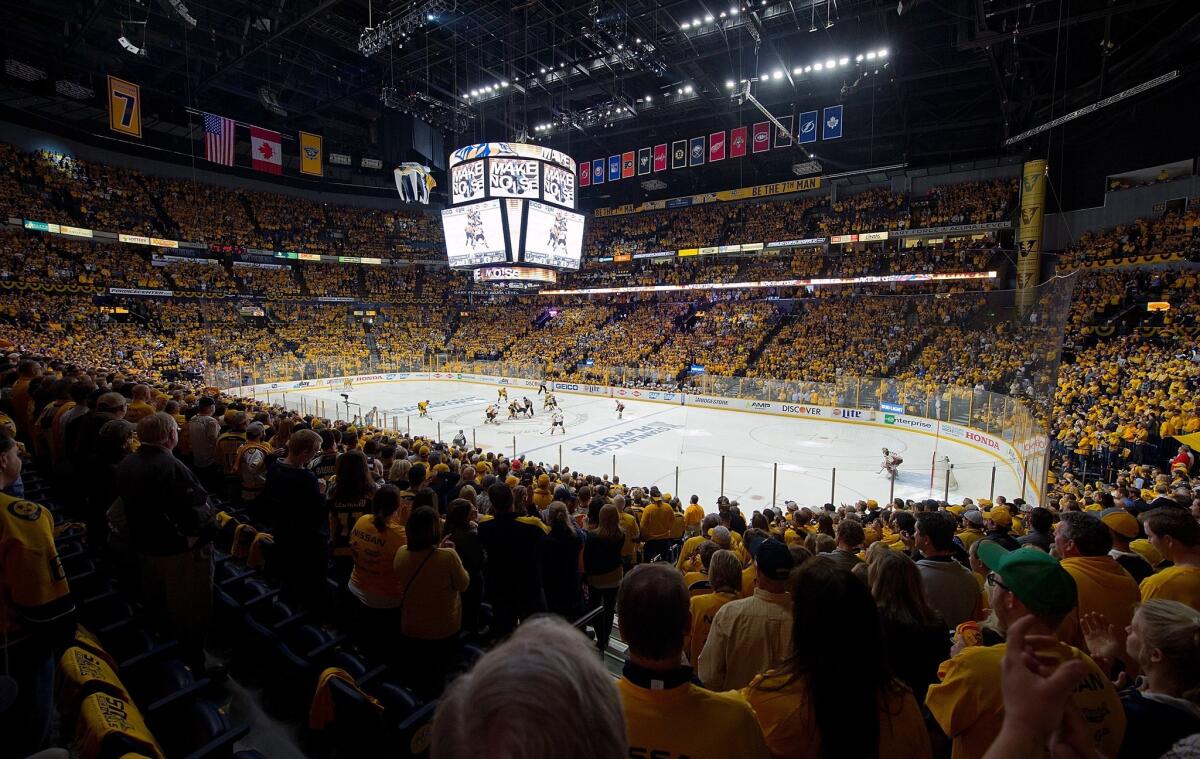Ducks hope for more road-ice advantage in Game 4 vs. Nashville Predators

The Ducks had no trouble dealing with the crowd at Bridgestone Arena on Tuesday, handing Nashville a 3-0 loss for their first win in the teams’ playoff series.
- Share via
Reporting from Nashville — Once upon a time, home-ice advantage was a significant edge in the NHL, especially during the playoffs. The old Montreal Forum supposedly had actual ghosts that helped the Canadiens win, but in other cities the home team simply tried to create a forbidding atmosphere that made it difficult for the visiting team to succeed.
Not so anymore. The road team won 16 of the first 30 playoff games contested this spring, including each of the first three games of the Ducks’ first-round series against the Nashville Predators. The Ducks, who got back into the series with a 3-0 victory on Tuesday, will try to even it up Thursday night at Bridgestone Arena.
“I don’t know what it is with that record,” Predators goaltender Pekka Rinne said after his team’s game-day skate. “For sure, we love to play in this arena and in front of our fans. I don’t know if it’s being nervous or what it is in the first game, but I’m just excited for tonight, and hopefully we can prove that record wrong.”
Ducks Coach Bruce Boudreau was stumped by the question of why home ice is no longer a great advantage.
“I wish I had an answer for that,” he said. “I think the teams now are so prepared that it doesn’t affect them. And after the first 10 minutes, like [last season] going through Calgary and Winnipeg, which are very loud buildings, you become numb to the noise.”
Predators broadcaster Terry Crisp won the Stanley Cup twice as a player with the Philadelphia Flyers during the “Broad Street Bullies” era, when visitors faced hostility on the ice and off at the Spectrum, and won the Cup again in 1989 as coach of the Calgary Flames. His theory is that parity is the biggest factor behind visiting teams’ now being able to compete well.
“Teams no longer fear walking into the other team’s building because they all have the sense that, you know what, it’s not that big of an advantage anymore,” he said. “Probably the biggest team that brought that into effect was the L,A, Kings the year they won it.”
He was referring to 2012, when the Kings opened each of their four playoff series on the road and won the first two away games. They also won Game 5 of their first-round series against the Canucks at Vancouver, and Game 5 of the West final against the Coyotes at Arizona. “It’s not an advantage anymore,” Crisp said.
Another likely factor is that so many NHL arenas are similar to each other now while places like the old Boston Garden and Chicago Stadium, whose distinctive characteristics made them unique, are history. In those arenas, as well as in Buffalo, the ice surface was shorter than the regulation 200 feet and those teams tailored their rosters to thrive with a shorter neutral zone.
“I hated going into Boston Garden and hated going into Chicago. Now it’s like you’re back in your own building,” Crisp said. “And let’s be honest, the other night there was no home advantage [for the Predators] because the Ducks took us out of it right away, took the fans out of it.”
The Ducks plan to use the same lineup as they did in Game 3, which includes Frederik Andersen starting in goal again after his 27-save shutout in Game 3.
The NHL has held off on announcing a starting time for Game 5, which will be played Saturday at Honda Center, while it waited to see the outcome of other series. However, the league was expected to specify a starting time after Thursday’s game.
The Ducks were scheduled to stay overnight in Nashville and fly back to Southern California on Friday morning.
Twitter: @helenenothelen
More to Read
Go beyond the scoreboard
Get the latest on L.A.'s teams in the daily Sports Report newsletter.
You may occasionally receive promotional content from the Los Angeles Times.










